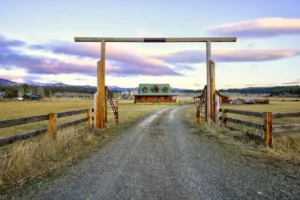 Just minutes away from Stephenville, you will find 12 beautiful acres. This acreage is covered with towering hardwoods and has several beautiful sites for building the home of your dream. Sandy loam soil makes it perfect for horses, livestock and all agricultural endeavors. The property has a gated entrance and new fencing around its perimeter. It is ag exempt and has already been surveyed. United Coop is bringing fiber-optic internet to you soon!
Just minutes away from Stephenville, you will find 12 beautiful acres. This acreage is covered with towering hardwoods and has several beautiful sites for building the home of your dream. Sandy loam soil makes it perfect for horses, livestock and all agricultural endeavors. The property has a gated entrance and new fencing around its perimeter. It is ag exempt and has already been surveyed. United Coop is bringing fiber-optic internet to you soon!
Greener Pastures -Tax Benefits for Farmers
 Many people purchase rural land for a variety of reasons. Many people want to live in rural areas and enjoy the serenity. Some people like the idea to buy and hold on to the land, waiting for the city to come to them.
Many people purchase rural land for a variety of reasons. Many people want to live in rural areas and enjoy the serenity. Some people like the idea to buy and hold on to the land, waiting for the city to come to them.
Investors generally want two things: return of their money (initial investment) and an economic return on the money invested. Rural land investment has been considered a way to achieve these two goals. Rural land will almost certainly yield an economic return if you wait long enough. Many investors buy land to hold for a long time, waiting for the market to create a favorable profit.
While holding rural land, and waiting for the land to become profitable, investors may want to consider operating a farm. Farms and farmers receive a favorable tax treatment. There is a strong pro farm current in many U.S. law (not just tax laws). The subsidy bills, which congress passes about every five years, are the most prominent federal laws geared toward agriculture. The average American might be surprised by the extent to which the federal governments subsidizes U.S. agriculture.
Harvesting Tax Savings
In Texas, the agricultural use valuation is one of the most popular property tax benefits. It is also known as an “ag exclusion.” This treatment can save you a lot of money. It’s not an exception, but a special way to value the real estate. In 1978, Texas’ Constitution was amended so that open-space land could be valued based on its productivity. In 1995, the Texas Constitution was again amended to allow agriculture appraisals for land used to control wildlife.
Property tax valuations are generally based upon the best use of land. However, agriculture landowners have the right to have their property tax calculated based on their productive agriculture value. The agriculture exemption can result in significant cost savings. Anyone purchasing rural land should be aware of the requirements to obtain an agriculture exemption.
For the special agricultural valuation, approximately ten acres of agricultural land are required. The land must be used primarily for agricultural purposes in five of the seven years preceding. The landowner must apply for the special agriculture appraisal with the local appraisal district.
Farmers can also get a tax break on certain items that are used exclusively for the production of agricultural products. This includes sales and use taxes and fuel taxes. To claim the exemption, the landowner will need to apply to the Comptroller of Public Accounts and obtain an agriculture registration number. This number can then be used when purchasing items that qualify. A tax exemption for agriculture from fuel and sales taxes can result in significant cost savings.
What is agriculture use?
The term “agriculture use” has a broad definition. The comptroller’s manual for the appraisal of agricultural land is the principal guideline. It states that agricultural use includes cultivating soil, producing crops, raising or keeping livestock or poultry, or fishing, or planting cover crops. The land may be used for exotic animals, birds (or bees), timber harvesting or wildlife management. Local appraisal districts publish guidelines on the level of agricultural intensity generally accepted by the county.
For federal tax purposes, IRS guidelines indicate farming could include:
- Operating a nursery, sod farm or a turf farm;
- Raising or harvesting fruit, nuts or other crops from trees;
- Raising ornamental trees is possible (but only if the tree is more than six years of age when it’s severed from its roots).
- Raising, shearing and feeding animals, as well as caring for, training and managing them;
- It is possible to lease land to a tenant who is engaged in farming, but only when the lease payments are determined by a written agreement that was entered into before any significant activities were undertaken on the land.
But the IRS cautions that farming does not include:
- contract harvesting of an agricultural or horticultural commodity grown or raised by someone else, or
- merely buying or reselling plants or animals grown or raised by someone else.
Hobby Losses
Another important tax benefit of owning and operating a farm is using economic losses from the farm to offset other ordinary income. The weekly release of current tax developments routinely includes at least one Tax Court case involving someone attempting to sustain tax losses from rural property that is said to be a farm (or ranch), and the IRS arguing that the taxpayers are merely engaging in a hobby.
The basic rule of “hobby losses” is often quoted but perhaps not readily understood. The governing statutes from the tax code distinguish trades or business from activities other than those engaged in for profit-or those engaged in as a hobby. The Internal Revenue Code allows a taxpayer to deduct “all the ordinary and necessary expenses paid or incurred during the taxable year in carrying on any trade or business” [IRC SS162(a)]. However, if the activity giving rise to the expenses “is not engaged in for profit,” deduction of expenses incurred in the activity is permitted “only to the extent that the gross income derived from such activity (i.e., the not-for-profit activity) for the taxable year exceeds the deductions.”
Activities not engaged in for profit are usually referred to as “hobbies.” Hobby expenses may be deducted from hobby profits but not from any other income the taxpayer may have. Of course, this is exactly what a taxpayer hopes to achieve by owning rural property–to deduct large sums of money year after year against other income the taxpayer derives from other (and genuine) businesses or trusts or other conventional sources of income.
Hobby loss rules are based on a presumption. An activity is presumed to be engaged in for profit if the activity shows a profit for any of three out of five consecutive years ending with the year for which tax deductions are taken. For horse breeding, training, showing, or racing, the period is extended to two out of seven years. This presumption is not an absolute bar from using the losses against ordinary income. Rather, the hobby loss rule is a presumption in favor of a hobby. This means the taxpayer can take deductions in excess of income over a longer period provided the taxpayer can overcome the presumption that the losses are engaged in for a hobby (i.e., not engaged in for profit).
An activity constitutes a “trade or business”–and it escapes the hobby loss limitations–if the taxpayer has an actual and honest objective to realize a profit. The courts look at all surrounding facts and circumstances.
In one of the more prominent cases, an Indianapolis restaurant owner and operator maintained a horse-training activity outside of the city. The Tax Court denied him the deductions on the grounds that he was engaged in a hobby, but the U.S. Court of Appeals (Seventh Circuit) upheld the deductions stating that the Tax Court misapplied the usual factors considered. The Circuit Court rejected the Tax Court’s explanation that a profit motive will not be found when a taxpayer combines horse-racing activities with social and recreational activities. The Circuit Court explained that a business owner’s enjoyment of his business doesn’t automatically make the activity a hobby.
Income Averaging for Farmers
Although income averaging is no longer generally available, farmers retain this helpful feature. They can average their incomes over three years.
Since farm income can vary widely from year to year, the ability to average becomes an important benefit. It provides a way to balance an income tax burden over several years, reducing the effects of both lean and bounty years. Tax brackets increase the more income one earns. Thus, for bounty years, taxes increase because the tax bracket increased. Averaging allows the taxpayer to reduce the harsh effect of the higher brackets in the bounty years.
Special Rules for Debt Relief
Special relief from cancellation of indebtedness income is an important tax provision for the farmer.
For most taxpayers, when debt is cancelled, the relieved debt is income. The principal exception is when the taxpayer is insolvent. If debt is cancelled when the taxpayer is insolvent, there is no income. Farmers do not have this requirement. They can avoid debt cancellation income if the debt was incurred directly in connection with the farm’s business activity and the taxpayer’s predominate income (over 50 percent) for the past three years comes from farming. The lender or creditor of the debt in question must also be in the business of lending money.
Conservation Improvements and Restoration
Expenditures for conservation expenses is an important area of favorable tax rules for farmers.
These types of expenses are normally capitalized, but for farmers they are deductible. The tax code provision describes the pertinent conservation expenses as those for the purposes of soil and water conservation with respect to land used in farming, or for the prevention of erosion or farmland.
The farmer is required to have a conservation plan, which the U.S. Department of Agriculture must approve. If there is no plan, the improvements must be consistent with a soil conservation plan of another state agency concerned with farming.
Deductions for conservation expenses are limited to 25 percent of farm gross income, but a carryforward is permitted. The limitation being expressed as a percentage of gross farm income is an important feature, suggesting the potential for offsetting other nonfarm income.
Vehicle Expense
Farmers receive liberal treatment for their auto and vehicle expenses.
The normal requirement of documentation to support auto or truck expense is waived for farmers. Up to 75 percent of vehicle expenses are deductible even without documentation.
Nothing in this publication should be construed as legal or tax advice. For specific advice, consult an attorney and/or a tax professional.
Original Blog: https://www.recenter.tamu.edu/articles/tierra-grande/Greener-Pastures-2386
Happy Independence Day!!
Happy Fourth of July from the realtors at Preferred Properties of Texas! We hope you have a safe and enjoyable day celebrating our Nation’s independence with family and friends. Enjoy the fireworks, the barbecue, and the good company.
We are proud to be a part of this community and to help people find their dream homes. We are committed to providing our clients with the best possible service, and we are always happy to answer any questions you may have.
If you are looking for a new home in the Stephenville area, please don’t hesitate to contact us. We would be happy to help you find the perfect place to call home.
Thank you again for your business, and we hope you have a wonderful Fourth of July!
Sincerely,
The Realtors at Preferred Properties of Texas
5 Things to Know Before Filling Out a Loan Application
 When you decide to finance and buy a house, the first thing that will likely happen is for you to fill out and get a hold of a loan application. You can either complete the application in front of your loan officer or on a lender website. You need to be aware of a few important things before you start the mortgage application process. Here are five.
When you decide to finance and buy a house, the first thing that will likely happen is for you to fill out and get a hold of a loan application. You can either complete the application in front of your loan officer or on a lender website. You need to be aware of a few important things before you start the mortgage application process. Here are five.
There’s a big difference between submitting a loan application to get a loan approved and completing some basic info to receive a letter of prequalification. To receive a complete preapproval you will need to fill out all the fields in the app. Leave a question blank if you are unsure of the answer. Your loan officer will contact you with additional information. Prequalification is a very simple process. You’ll only be asked a few questions. The loan application is much more detailed.
You’ll be asked to complete information regarding your income and assets, so be ready to fill the application in with approximate account balances along with account numbers and institution’s name. Prequalification is based on your word, but a loan application requires more information. It is not necessary to enter your current balance down to the penny. An approximation of the amount will suffice.
You may have been known under a different name. If you applied for credit with a name other than your own, you will need to provide proof and explain why. Your lender may want to know if you have a maiden or other name on your credit report.
Have your most recent pay stubs handy when entering your income. This piece of paper contains your gross monthly income and your year-to date income. To calculate debt-to income ratios, gross monthly earnings is used. Tax returns are usually required if you’re self employed or rely on income that exceeds 25% of your monthly salary. These returns will be used by your lender to calculate and verify qualifying income.
Understand that your lender may ask for additional information even if you have provided all the necessary documentation. It’s usually just a matter of updating information in your loan file. But, whenever you are asked to provide additional information, do not wait. Be prompt.
Original Blog: https://realtytimes.com/archives/item/1047225-5-things-to-know-before-filling-out-a-loan-application?rtmpage=
Just Listed! Lovely Home in Stephenville, Texas
 A Slice of Country Life, approx 2.5miles from Stephenville. A spacious brick home set on 1.5 acres. The front of the home is lined with large Red Oaks and Pecan trees. Property has a metal workshop appx 40×50 feet with 220 electrical power and tons of shelving. Covered parking attached, perfect for RV or boat. A great dog kennel set-up. The gardener is sure to appreciate the fenced Garden with water and fruit trees. This beautiful home has a large living room with a lovely brick fireplace, as well as an open formal dining area. The galley-style kitchen is equipped with built-in appliances and plenty of cabinets. A bright Breakfast Nook, for eat-in kitchen dining. Large Utility room with storage, shelving and space for a freezer or extra refrigerator. Split bedroom arrangement. The large primary bedroom features a walk in wardrobe, a double vanity bath, and a walk in shower. Additional bath has tub and shower combo for the two additional bedroom. This home is full of amenities that you must see. Please don’t miss out on this super great find.
A Slice of Country Life, approx 2.5miles from Stephenville. A spacious brick home set on 1.5 acres. The front of the home is lined with large Red Oaks and Pecan trees. Property has a metal workshop appx 40×50 feet with 220 electrical power and tons of shelving. Covered parking attached, perfect for RV or boat. A great dog kennel set-up. The gardener is sure to appreciate the fenced Garden with water and fruit trees. This beautiful home has a large living room with a lovely brick fireplace, as well as an open formal dining area. The galley-style kitchen is equipped with built-in appliances and plenty of cabinets. A bright Breakfast Nook, for eat-in kitchen dining. Large Utility room with storage, shelving and space for a freezer or extra refrigerator. Split bedroom arrangement. The large primary bedroom features a walk in wardrobe, a double vanity bath, and a walk in shower. Additional bath has tub and shower combo for the two additional bedroom. This home is full of amenities that you must see. Please don’t miss out on this super great find.
Why Ranch Ownership Could Be Your Next Great Investment
Are you considering investing in a ranch? Owning a ranch can be an excellent way to diversify your investment portfolio, while creating a source of income. Owning a ranch is a great investment because it offers many benefits. Ranch ownership is a great investment for many reasons, from increased property values to sustainability.
The Financial Benefits of Ranch Owning
Many people may think that investing in a cattle ranch is a luxury they can’t afford. The financial benefits that come with owning a farm may make it more feasible than you think.
Owning a farm can be a great investment. Your land’s value will increase over time, especially if improvements are made, such as adding a barn or fencing.
You can expect a significant return on investment if you decide to sell the ranch at a later date. Renting out your ranch to farmers and ranchers can be a great way to earn a regular income. Your property may be suitable for farming or livestock grazing, which will generate a steady income stream without you having to do much work.
Ranches can be an excellent investment. You may be able deduct expenses associated with land ownership depending on your circumstances. This includes property taxes, mortgage interests, and even maintenance costs.
Ranch ownership is a great way to diversify your portfolio. Land is an tangible asset that can retain its value during economic downturns.
Owning a ranch has many financial benefits. These include potential appreciation, ongoing income streams, and tax deductions. It’s vital to consider all your options and to work with professionals who are experienced to ensure you make a wise investment.
Tax Benefits for Ranch Ownership
The potential tax benefits of owning land, and a ranch in particular, are one of the many advantages. You may be eligible for various tax credits and deductions depending on the way you use your property.
You can deduct several expenses if you own a ranch. You can deduct any costs related to the management of your property. This includes repairs, maintenance and utilities. You may also be able claim a deduction if you use the land you own for agricultural purposes such as raising animals or growing crops.
A ranch can also provide tax benefits by claiming conservation easements. These easements are agreements which limit the use or development of a property to protect wildlife habitat or natural resources. You may receive a significant tax deduction by donating a conservation agreement. This will preserve your land for future generations.
If you sell your ranch you may qualify for a special tax incentive known as a “1031 exchange”. You can defer capital gains tax on the sale of a property by reinvesting the proceeds into another piece of realty within a specified timeframe.
Ranch ownership offers significant tax advantages. Consult a tax expert to make sure you are taking full advantage of the credits and deductions available. You can enjoy the lifestyle and conservation benefits while maximizing the financial benefits.


